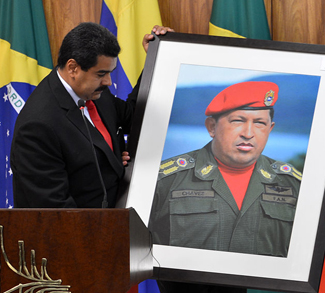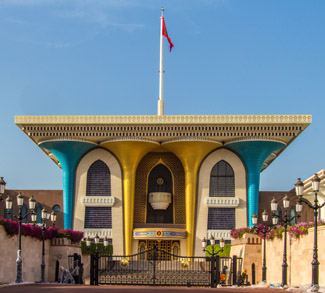95% of transport fuels in the world are derived from oil. This makes it hard to argue that renewable or other non-petroleum sources of fuel could cut into oil’s market share, at least in the near term. Transportation, and thus petroleum, is essential to growing economies like China and India and petroleum security will continue to be essential for the global economy.
So who controls oil? You guessed it; the Middle East and North Africa dominate the global oil sector and the future of energy security.
With the exception of Canada and the U.S., across the board, these countries are dictatorships or false democracies that are often subjected to artificial elections where the outcome is always in favor of the current “democratically” elected dictator.
Why are most Middle East governments dictatorships?
Simply put, dictatorships are easier and more efficient to deal with, especially with something as precious as petroleum security. For businesses involved in the oil industry, Dick Cheney said it best: “The good Lord didn’t see fit to put oil and gas only where there are democratically-elected regimes friendly to the United States. Occasionally we have to operate in places where, all things considered, one would not normally choose to go. But, we go where the business is.”
Essentially, dictators provide Western companies with immense wealth and the opportunity of vast and cheap reserves. At the same time, these Western companies are headquartered in countries with democratically elected representatives in government. These democratic governments, although against their core values, will need to deal with hostile and mismanaged governments in the Middle East and North Africa. They do this to secure petroleum and keep Western oil companies active, efficient, and profitable in the Middle East & North Africa, and of course to feed the insatiable appetite for oil in the West. The best way for democracies to ensure control over these countries is to indirectly influence and/or prop up dictatorships. This level of influence over dictatorships allows democracies in the West to pick and choose who rules where by initiating coups, military support, or, simply, severing ties with those dictators and their allies.
The three countries where dictators fell victim to the influence of democracies or lack thereof were Iraq, Libya, and Egypt. The first to fall was Saddam Hussein’s dictatorship in Iraq.
Act 1: Saddam Hussein in Iraq (1979-2003)
In the summer of 1979, Saddam Hussein, an Iraqi native from Tikrit, was sworn into power as the 5th President of Iraq. Saddam’s legacy as one of the most brutal and unpredictable Sunni leaders in Iraq began in 1980 when he launched a surprise war against Shia dominant Iran. Saddam’s mission was to first destroy and then control Iran’s crude oil reserves with the support of the Sunni Gulf countries.
Iraq, unable to destroy Iran’s air force, allowed Iran to retaliate immediately with air support barraging oil facilities in Iraq’s southern region. Iraq was clearly unprepared and Iran took full advantage as the country started to move into Iraqi territory around Basra, Iraq. In a panic, Saddam was forced into a corner and after using mustard gas on bordering Iranian cities, he turned on his own people in northern Iraq and attacked a Kurdish town with cyanide bombs, killing thousands in 1988.
Meanwhile, passing through the Strait of Hormuz, Kuwaiti tankers would carry Iraqi oil and were often victim to Iran’s relatively powerful navy. When oil transportation through the largest waterborne passage was put at risk, the affected U.S. came to secure supplies by re-flagging Kuwaiti ships as American.
The Gulf War
With Iran at bay, Iraq’s economy was in ruins with most of its oil infrastructure and facilities destroyed. As the economy’s lifeblood suffered, Saddam made one of the most shocking moves in geopolitical history. He turned on the countries that supported his invasion of Iran. Saddam began his move into Kuwait motivated by the same objective of his Iranian invasion: securing oil reserves and facilities. Iraq rolled over the country, setting ablaze to oil wells throughout Kuwait.
The one mistake Iraq made was pointing its tanks towards Saudi Arabia. In 1990, a threat to Saudi Arabia was a threat to the United States. Saudi Arabia was the United States’ energy security and in return, the US military was Saudi Arabia’s military. Needless to say, Iraq’s military was pushed back and Saudi Arabia was faced with a choice: support an erratic Sunni ruler or create instability that could be filled by Iranian influence. Iranians sought strategic power in southern Iraq from the Arabian Gulf up through the Basra oil fields. If Iran could control most of the Iraqi oil, it could dictate the direction of the country.
The 2003 Invasion of Iraq
The U.S. made Saudi Arabia’s decision for them as they invaded Iraq in 2003, claiming Saddam Hussein had acquired “weapons of mass destruction.” These claims have since been proven false, yet the exact reason as to why the U.S. invaded Iraq is the subject of fierce debate and, sometimes, conspiracy. Either way, Saudi Arabia’s fears came to fruition as a Sunni “democratic” government was difficult to establish, and the Shia dominated country of Iraq would now be ruled by a “democratically” elected Shia government tied to Iran. The once oppressed Shia majority were now in power and able to rule with impunity.
The Iraqi Proxy
Following the US occupation of Iraq, the country has continued to be a battleground between Shia and Sunni Muslims. The easiest way to rally citizens behind a cause is to give them a distinct identity and use that identity to manipulate them. Saudi Arabia and Iran are using religious militias, terrorist groups, and townspeople as proxies for an ultimate fight for power.
Realistically, Saudi Arabia is aware that Iraq is under Iranian control with a majority Shia population residing south of Baghdad and the Kurds controlling the northeast. What the Saudis hope to do is keep Iraq in a consistent and organized chaos for years to come.
How did Iraq fall back into war?
Iraq’s “democratically” elected Shia Prime Minister, Nouri Al-Maliki (who ruled from 2006 to 2014), has close ties to Iran and consistently marginalized the Sunni minority. From 2003-2007, the population of Sunnis in Baghdad dropped from 45% to 25%.
Maliki’s reluctance to disarm Shia militias caused an all-out war within Baghdad between Sunni and Shia militias and terrorist groups in 2006/2007. Meanwhile in the background, regional Sunni tribes were forming the beginnings of Daesh; these fighters fought back against Shia militias and Al-Qaeda. They joined the Iraqi army and Maliki was not happy with their participation in a Shia led government.
Maliki focused on disarming Sunni militias, Iraq’s own Sunni militants, and removed Sunni representation from office. In 2011, Maliki ordered the arrest of Iraq’s Sunni vice president, Tariq Al-Hashimi, who was sentenced to death 5 times. Hashimi was able to flee Iraq before his arrest. With the outbreak of the Arab Spring movement in 2013, Maliki massacred several Sunni protesters in Mosul, an action that would be the catalyst for the Sunni offensive against Iran’s propped up government. Daesh made its way into Iraq through the most oppressed areas, taking Mosul, and then headed southeast towards Baghdad.
The Basra and Baghdadi oil fields and infrastructure are key to Iraq’s economy and those are fiercely protected by Iraqi Shias and Iran’s militias. To the north, the oil fields around Kirkuk are protected by strong Kurdish forces, the Peshmerga, whom in turn are protected by US and European interests. The truth is that Iraq has always been three separate states that were built around oil resources; the invasion of Daesh merely clarified those lines.
The proxy war between the Saudi Arabia-led Sunni offensive from Mosul to Ramadi and the Iran-led Shia southern region from Baghdad to Basra will not be dramatically interfered with by the U.S. As long as oil keeps pumping out of Basra in the south and consumers like China and India get their fair share of Iraqi oil, it is not in the US interest to change Iraq. Iraq is in a current state of organized instability and either Iran or Saudi control of Iraq will have minimal effects on US energy security; especially as India and China form their own relationships with Saudi Arabia and Iran.
Act 2: The Arab Spring in North Africa
What first started with a man being abused and harassed by police in Tunisia, led to that same man lighting himself on fire due to his frustration with the misappropriation of power and, thus, began the Arab Spring in 2011. The movement of peoples’ frustration with their government made its way from Tunisia, to Libya, Egypt, Syria, Yemen, and Iraq. It was dressed delicately in a fictitious democratic movement.
In 2011 North Africa was no longer an asset to the Western democracies. The West saw it fit to allow these regimes to fail by relinquishing support for their dictators. These dictators have been in power for 30+ years and that is a lot of time and money spent on oppressing for the economic efficiency of the West. Think of the Arab Spring as a dictator cleansing, creating a new regime in a new light would lessen the tension between dictators and their people or create another false veil of “democracy” to continue another economically efficient dictatorship – efficient to the West that is. Additionally, by creating a power vacuum, Western powers invited Arab Gulf countries to take more of a leadership role in these regimes.
Not to say everything boils down to oil, but it doesn’t hurt. By 2011 there was a shift in the entire continent of Africa. Initially, West Africa was the primary supplier of US light oil from Angola and Nigeria; therefore, Libya was an important source of light oil to Europe. US shale shifted this dynamic where less crude was being imported by the U.S. from West Africa.
Most of that Nigerian and Angolan light sweet crude (light by which refiners could break hydrocarbons – the lighter the oil the easier to break – and sweet by the low sulfur content which resulted in a cleaner fuel to refine and process) went to Europe. These were the second-largest reserves next to Libya, and they were in much more stable condition.
This transition sheltered Europe from short-term petroleum shortfalls as the Arab Spring intensified and Libyan oil exports became extremely volatile.
Saudi Arabia vs. Qatar
Western powers have taken an active role to keep Arab states more involved in the dictatorships they support. Shifting to building influence in Asia with rising powers in India and China, it is not so much that the U.S. and other Western powers want to get out of the Middle East business, but they want to limit their risk in the region.
During the Arab Spring, North Africa became a fight between two unusual Sunni-Gulf allies: Saudi Arabia and Qatar. For decades, Qatar and Turkey have been staunch supporters of the Muslim Brotherhood, an organization adamantly opposed by Saudi Arabia because of the Muslim Brotherhood’s opposition to monarchs and dictatorships. Qatar and Turkey want to spread Islamic democracy and social justice, including Islamic foreign policy; in the other camp, Saudi Arabia is against Islamic democracy that threatens dictators and monarchs, and any foreign policy that would isolate Islamic regimes.
Ghaddafi Overthrown
Propped up by Qatar and UAE (Saudi-allied), the Libyan people were able to overthrow the 40 year rule of Muammar Ghaddafi in 2011 in hopes of a transition to democracy. Post Ghaddafi, Libya was split by east and west with Qatar controlling most of the well-established oil infrastructure and export capacity in the west; whereas, Saudi Arabia and its allies controlled the less established eastern oil infrastructure. The Muslim Brotherhood took control of the west, headquartered in Tripoli, through the New General National Congress. Foreign support allowed the Islamist movement to maintain power in the west and brought in other terrorist groups like al-Qaeda, Ansar al-Sharia (Daesh affiliated), and Daesh.
To counter the power of the Muslim Brotherhood movement in the west, Saudi Arabia and its allies supported eastern movements with the Council of Deputies and Libyan National Army. Air strikes to weaken the Qatar/Turkey movement have been led by the U.S., Saudi Arabia, the UAE, and Egypt, but the country remains in civil war with no democratic solution in sight.
Egypt at Risk
Although Egypt is now an ally in the fight against the Muslim Brotherhood in Libya, the country fell victim to the same outcome as Libya. Egypt, on the other hand, was dealt with swiftly and aggressively by the Saudi offensive against the Muslim Brotherhood.
After the U.S. relinquished its support for Mubarak during the Arab Spring, the same battle in Libya took control of Egypt. In 2011, Hosni Mubarak was ousted after a 30-year reign as president, and as the US did nothing in the wake of the Arab Spring, the country fell into civil unrest. After holding “democratic” elections, the Qatar-supported Muslim Brotherhood’s Mohamed Morsi came to power. This power was short lived as Saudi, the UAE, and Kuwait encouraged a military coup in the summer of 2013 to shut down the Muslim Brotherhood.
The Sunni General of the Egyptian Army, Abdel Fattah El-Sisi, led a coup against Morsi. As the US kept its distance from the unrest, El-Sisi took “democratic” control of the country through rather exaggerated election results. El-Sisi took steps to improve the economy and increase international participation in Egypt, something Morsi completely disregarded. Egypt was now backed by large Gulf countries with deep pockets.
This allowed Egypt to pay down financial obligations owed to international energy companies operating within the country and brightened Egypt’s energy future.
The recent discovery of the largest Mediterranean gas deposit, Zohr, occurred offshore in Egypt. Additionally, as Egypt continued to pay down obligations to energy companies, more investment in the country came from global energy players like Apache (APA), Sinopec (SHI), Dana Gas, Shell (RDS.B), and Eni Spa (E). North American innovations like horizontal drilling and hydraulic fracturing have started to root themselves in Egypt with Apache, Shell, Dana Gas all testing in the West Desert of Egypt.
Egypt is not only a large energy player in North Africa, but it is an essential transportation connection between the Gulf countries and Europe and from the Mediterranean to Asia. With mounting gas discoveries in the Mediterranean like Zohr, the largest Sunni Islamic population, and the increasing movement of goods through the Gulf of Suez, Egypt is an essential economic, political, and sectarian asset.
Saudi Arabia, the UAE, and Kuwait have allocated $12 billion in funds to prop up Egypt financially in 2014. Saudi then promised another $8 billion to Egypt in 2016. Saudi Arabia has already allocated $1.5 billion for the development of the Sinai Peninsula and another $1.2 billion to finance Egypt’s oil purchases and energy needs.
Democracies – Appreciated, but not Ideal
The truth is that corrupt dictatorships are less costly than the transition to a real Western-type democracy in the short term. The cost of corruption is leaders and their bureaucratic counterparts misappropriating or holding funds and tax revenues for personal use. Democracies in the Middle East and North Africa are costlier in a region bogged down by a power struggle between competing powers: Saudi Arabia, Iran, Qatar, Turkey, and Israel.
The key to a transition to democracy is a selfless dictator; an oxymoron in it of itself. Thus, the only way to overthrow these dictators is through the angry and oppressed segments of the population. It often requires support from outside interests, creating a power vacuum, and these outside interests use the democratic transition to further expand their influence. These wars occurred in Libya, Egypt, Sudan, Yemen, Afghanistan, Syria, Iraq, the West Bank, and Gaza. The mess is often too much to handle for Western interests in the region and these democratic revolutions re-assemble into new dictatorships: the efficient outcome for petroleum security and economic benefit.
In an interview conducted by Tehran-based Press TV in the summer of 2013, a reporter asked a young boy if he thought Libya had become democratic after its first “democratic” elections being held. The boy immediately pointed to the streets and noted that democracy was here; he noted that police officers and militias were no longer harassing him as he walking on the streets. What was important to take from that was that this boy wasn’t talking about democracy – he was talking about freedom. All the oppressed and angered just want freedom from their tyrannical dictators. Western imposed democratic transitions are doing much more harm than good in establishing freedom as they continue the circle of re-establishing, self-interested, and oppressive dictatorships emerging from the continual power struggle in the Middle East & North Africa.
The opinions, beliefs, and viewpoints expressed by the authors are theirs alone and don’t reflect any official position of Geopoliticalmonitor.com.




